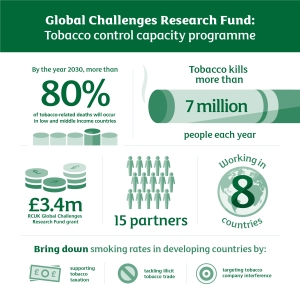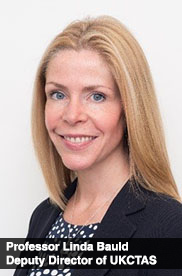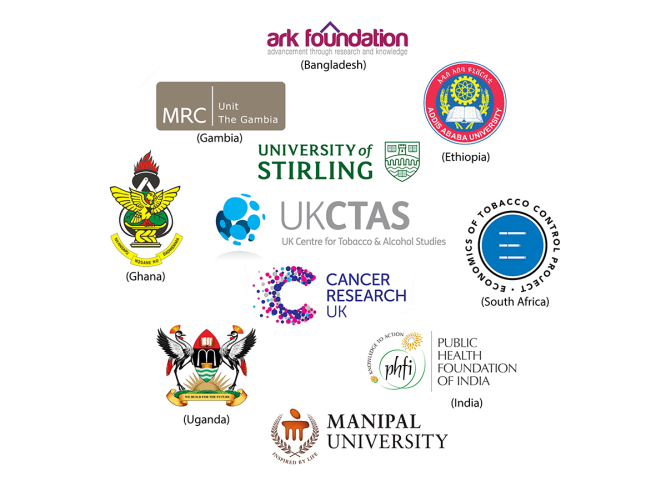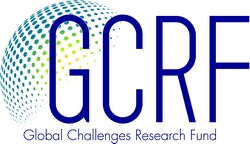UKCTAS and the Global Challenges Research Fund
UKCTAS researchers have been awarded a £3.4million grant from Research Councils UK to address tobacco-related harm in Asia and Africa. The programme will run for four years and aims to build capacity for tobacco control research in seven countries in South Asia and Africa.
 Led by Professor Linda Bauld, UKCTAS Deputy Director based at the University of Stirling, this Global Challenges Research Fund grant provides an example of how UKCTAS is able to bring together members of the UK tobacco control research community to respond to an opportunity to address tobacco use in low and middle income countries.It involves six of the academic teams within the UKCTAS consortia and Cancer Research UK, one of the UKCTAS funders. CRUK is already very active in international tobacco control research.
Led by Professor Linda Bauld, UKCTAS Deputy Director based at the University of Stirling, this Global Challenges Research Fund grant provides an example of how UKCTAS is able to bring together members of the UK tobacco control research community to respond to an opportunity to address tobacco use in low and middle income countries.It involves six of the academic teams within the UKCTAS consortia and Cancer Research UK, one of the UKCTAS funders. CRUK is already very active in international tobacco control research.
Professor Bauld said:
 “UKCTAS has made an important contribution to informing policies and new developments to reduce smoking rates in the UK over the past decade, culminating in the very significant prevalence reductions we’ve seen in the past few years. This is testament to the links we have worked hard to forge with government, NGOs, advocacy groups, professionals and the public who have helped translate our research into practice. Our work on smokefree public places, tobacco taxation, mass media, smoking cessation & stop smoking services, electronic cigarettes & tobacco harm reduction, and our monitoring of tobacco industry activity has all fed into these changes.
“UKCTAS has made an important contribution to informing policies and new developments to reduce smoking rates in the UK over the past decade, culminating in the very significant prevalence reductions we’ve seen in the past few years. This is testament to the links we have worked hard to forge with government, NGOs, advocacy groups, professionals and the public who have helped translate our research into practice. Our work on smokefree public places, tobacco taxation, mass media, smoking cessation & stop smoking services, electronic cigarettes & tobacco harm reduction, and our monitoring of tobacco industry activity has all fed into these changes.
Now through this GCRF programme we have a unique opportunity to help build capacity in 7 other countries, all in South Asia and Africa, adding to individual projects and links that UKCTAS members had already forged with some of these teams in recent years. A core element of our Centre has always been training and research development, from PhD through post-doctoral level, training professionals and engaging with stakeholders in the UK and Europe. Now we will be extending this through a substantial new programme of research and capacity building with a particular focus on tobacco taxation, the illicit trade and tobacco industry influence on policy. We will be working with the following list of senior researchers and their teams (below), as well as Alison Cox and her colleagues at Cancer Research UK, over the next four years. We are grateful to Research Councils UK for this opportunity.”
The UK co-applicants on the grant include: Professors John Britton and Andrew Fogarty (Nottingham), Professor Kamran Siddiqi and Dr Steve Parrot (York), Professor Jeff Collin (Edinburgh), Professor Anna Gilmore (Bath) and Professor Ann McNeill (Kings College).
International co-applicants include:
– Dr Wakgari Deressa, Addis Ababa University, Ethiopia
– Dr Muralidhar Madhav Kulkarni, Manipal University, India
– Professor Umberto Dalessandro, MRC Unit, the Gambia
– Dr Monika Arora, Public Health Foundation of India
– Dr Ellis Owusudabo, Kwame Nkrumah University of Science and Technology, Ghana
– Kellen Nyamurungi, CTCA, Makerere University, Uganda
– Dr Rumana Hugue, the ARK Foundation, Bangladesh
– Professor Corne van Walbeek, University of Cape Town, South Africa
Collaboration info-graphic showing the different organisations involved in the project:

About the GCRF:
The Global Challenges Research Fund (GCRF)  Research Councils UK Collective Fund is supporting projects in the range of £2 – 8 million over four years. It aims to build upon research knowledge in the UK, and strengthen capacity overseas, to help address challenges, informed by expressed need in the developing countries.
Research Councils UK Collective Fund is supporting projects in the range of £2 – 8 million over four years. It aims to build upon research knowledge in the UK, and strengthen capacity overseas, to help address challenges, informed by expressed need in the developing countries.
Jo Johnson, Minister for Universities and Science, said:
“From healthcare to green energy, the successful projects receiving funding today highlight the strength of the UK’s research base and our leadership in helping developing countries tackle some of the greatest global issues of our time.
“At a time when the pace of scientific discovery and innovation is quickening, we are placing science and research at the heart of our Industrial Strategy to build on our strengths and maintain our status as science powerhouse.”
Notes to editors
· Full list of research partners:
o UK Centre for Tobacco and Alcohol Studies (UKCTAS): Universities of Stirling, Nottingham, York, Edinburgh, Kings College London and Bath.
o Cancer Research UK
o The ARK Foundation, Bangladesh
o Manipal University, India
o The Public Health Foundation of India
o The University of Cape Town, South Africa
o Makerere University, Uganda
o The MRC Unit, The Gambia
o Addis Ababa University, Ethiopia
o Kwame Nkrumah University of Science and Technology, Ghana
· More details on each of the 37 grants can be found in the Growing research capability to meet the challenges faced by developing countries brochure.
· Find out more about the Institute of Social Marketing: www.stir.ac.uk/health-sciences-sport/research/groups/social-marketing.
· Find out more about the UK Centre for Tobacco and Alcohol Studies: ukctas.net
· Find out more about Cancer Research UK’s international tobacco control programme: http://www.cancerresearchuk.org/funding-for-researchers/applying-for-funding/funding-committees/international-tobacco-advisory-group
· Find out more about tobacco consumption via the World Health Organisation: www.who.int/mediacentre/factsheets/fs339/en/







 Led by Professor Linda Bauld, UKCTAS Deputy Director based at the University of Stirling, this Global Challenges Research Fund grant provides an example of how UKCTAS is able to bring together members of the UK tobacco control research community to respond to an opportunity to address tobacco use in low and middle income countries.It involves six of the academic teams within the UKCTAS consortia and Cancer Research UK, one of the UKCTAS funders. CRUK is already very active in international tobacco control research.
Led by Professor Linda Bauld, UKCTAS Deputy Director based at the University of Stirling, this Global Challenges Research Fund grant provides an example of how UKCTAS is able to bring together members of the UK tobacco control research community to respond to an opportunity to address tobacco use in low and middle income countries.It involves six of the academic teams within the UKCTAS consortia and Cancer Research UK, one of the UKCTAS funders. CRUK is already very active in international tobacco control research. “UKCTAS has made an important contribution to informing policies and new developments to reduce smoking rates in the UK over the past decade, culminating in the very significant prevalence reductions we’ve seen in the past few years. This is testament to the links we have worked hard to forge with government, NGOs, advocacy groups, professionals and the public who have helped translate our research into practice. Our work on smokefree public places, tobacco taxation, mass media, smoking cessation & stop smoking services, electronic cigarettes & tobacco harm reduction, and our monitoring of tobacco industry activity has all fed into these changes.
“UKCTAS has made an important contribution to informing policies and new developments to reduce smoking rates in the UK over the past decade, culminating in the very significant prevalence reductions we’ve seen in the past few years. This is testament to the links we have worked hard to forge with government, NGOs, advocacy groups, professionals and the public who have helped translate our research into practice. Our work on smokefree public places, tobacco taxation, mass media, smoking cessation & stop smoking services, electronic cigarettes & tobacco harm reduction, and our monitoring of tobacco industry activity has all fed into these changes. 
 Research Councils UK Collective Fund is supporting projects in the range of £2 – 8 million over four years. It aims to build upon research knowledge in the UK, and strengthen capacity overseas, to help address challenges, informed by expressed need in the developing countries.
Research Councils UK Collective Fund is supporting projects in the range of £2 – 8 million over four years. It aims to build upon research knowledge in the UK, and strengthen capacity overseas, to help address challenges, informed by expressed need in the developing countries.